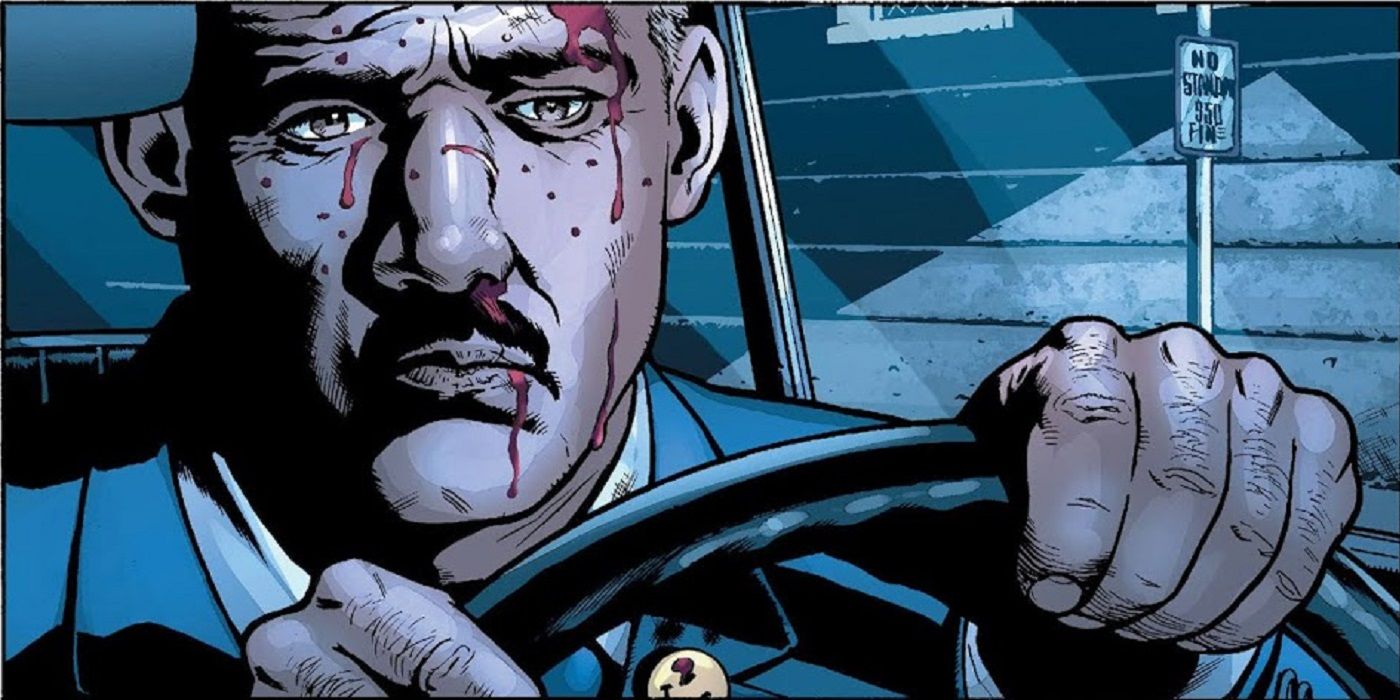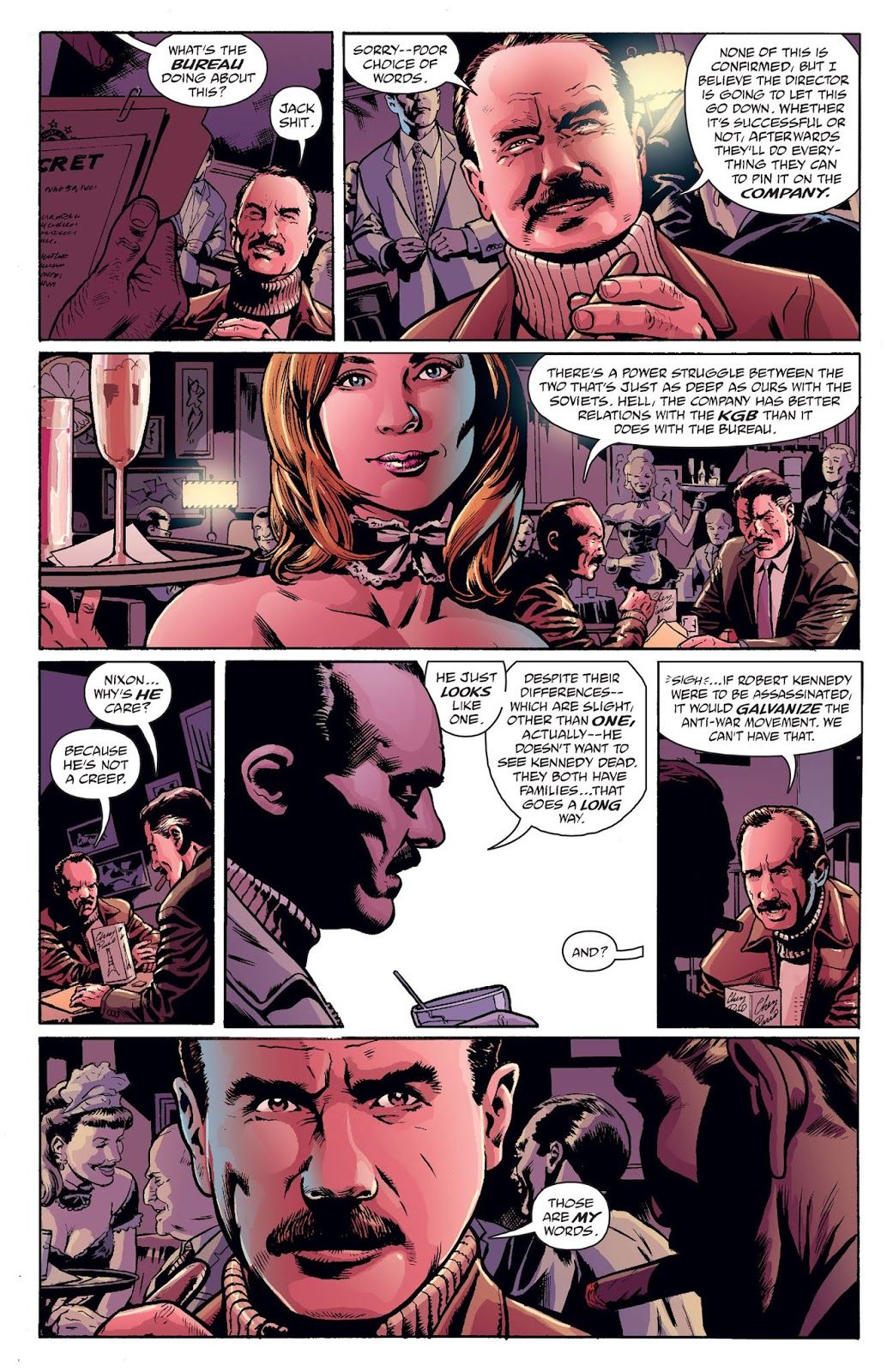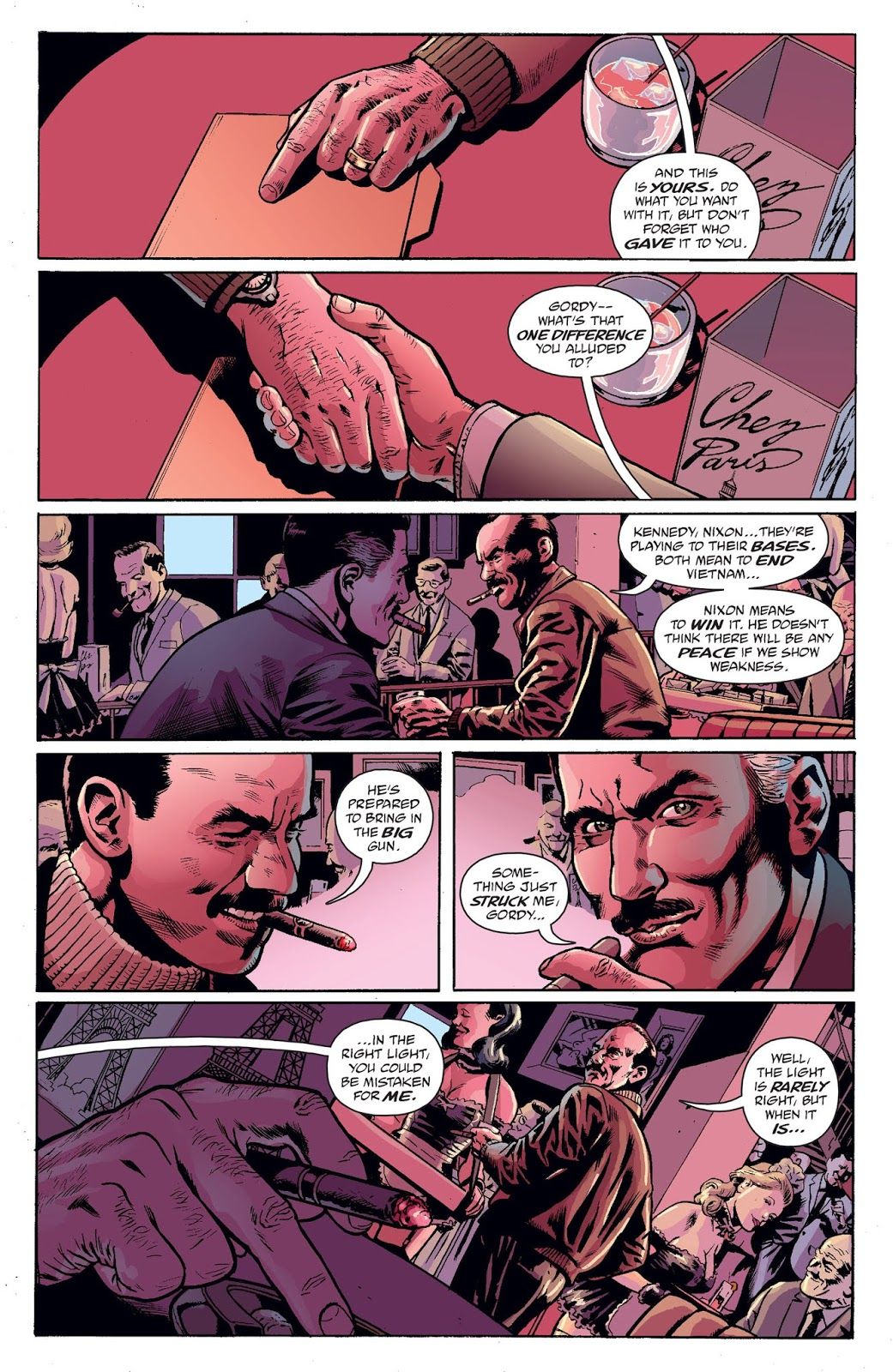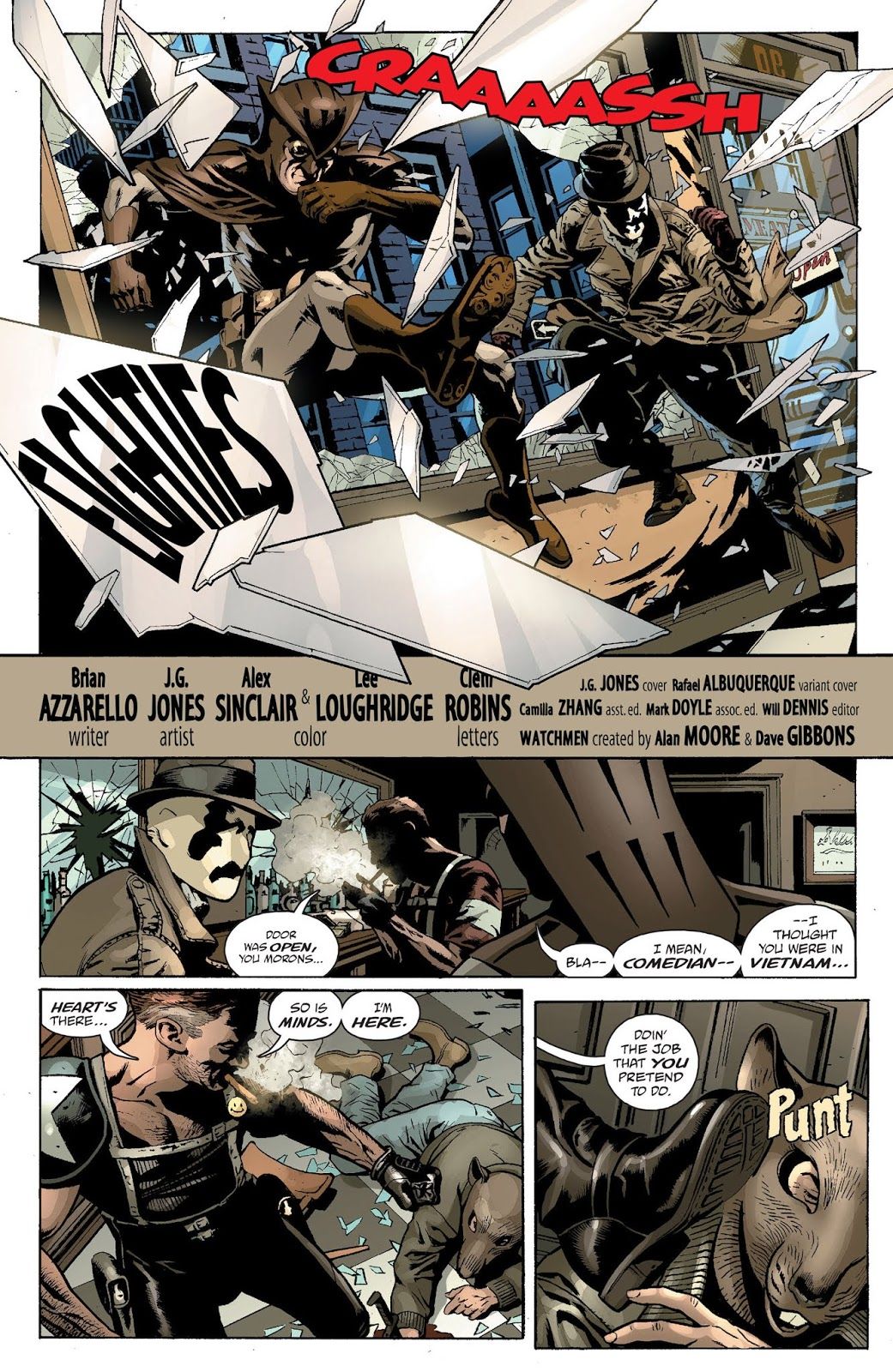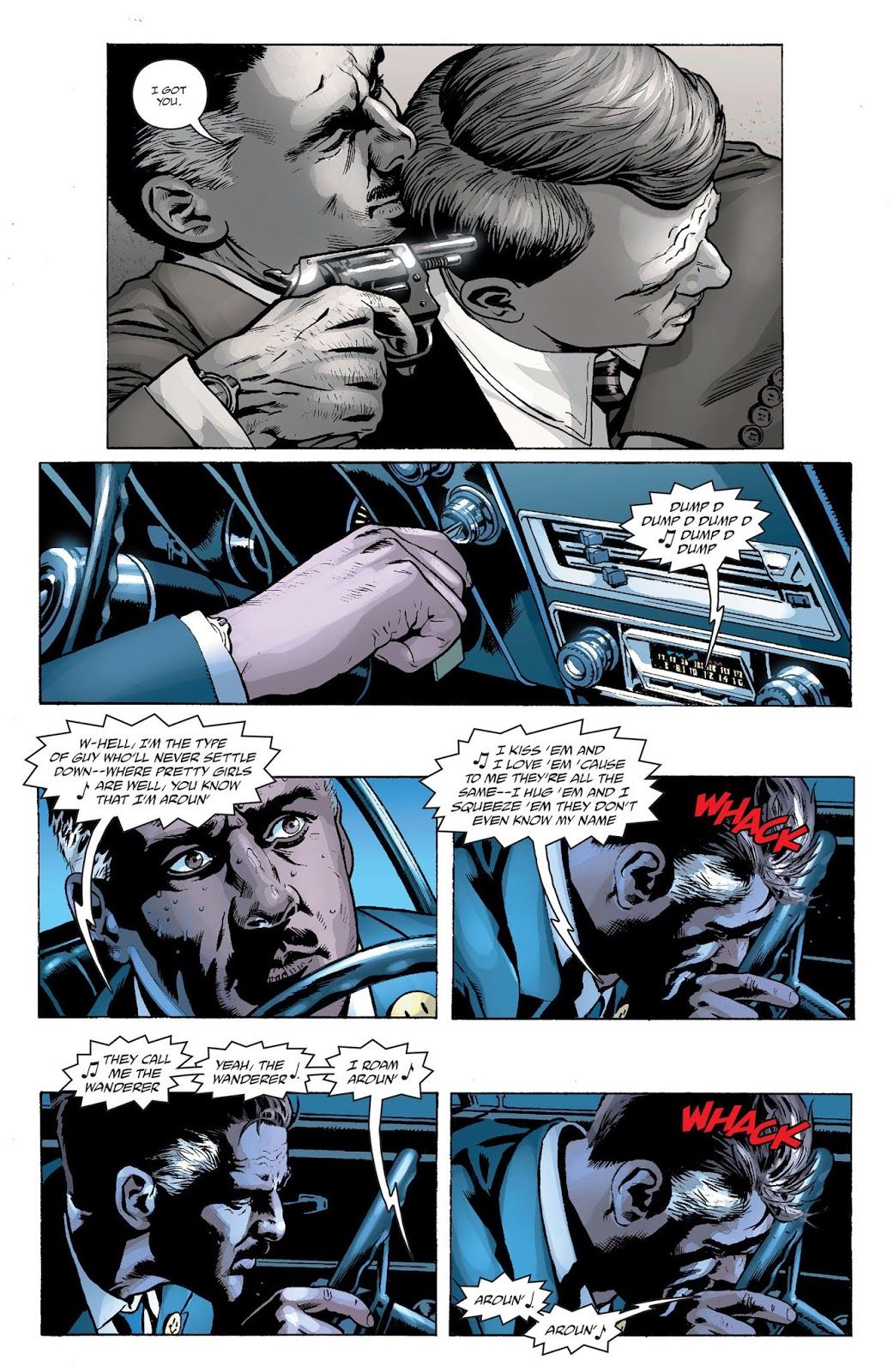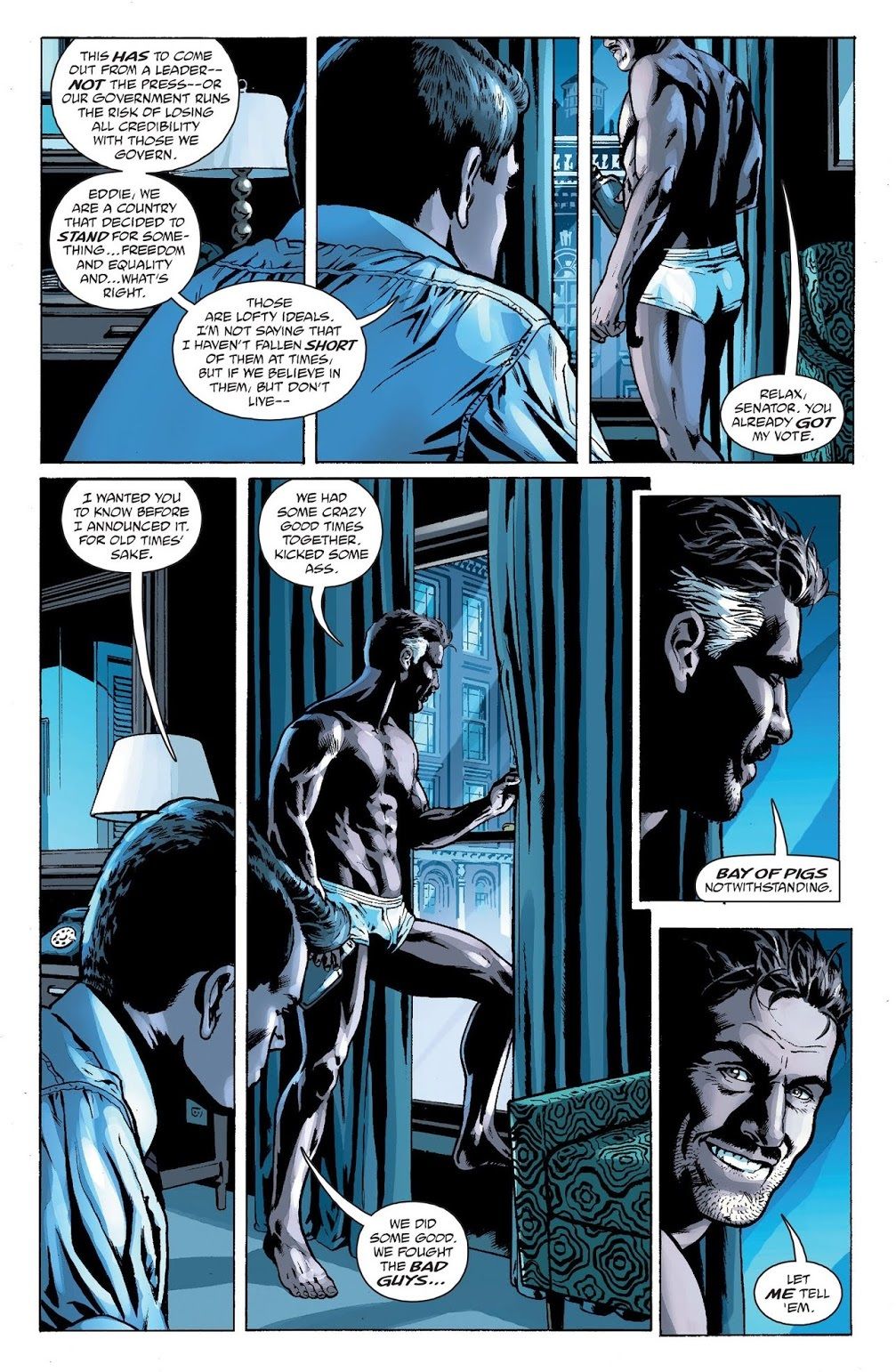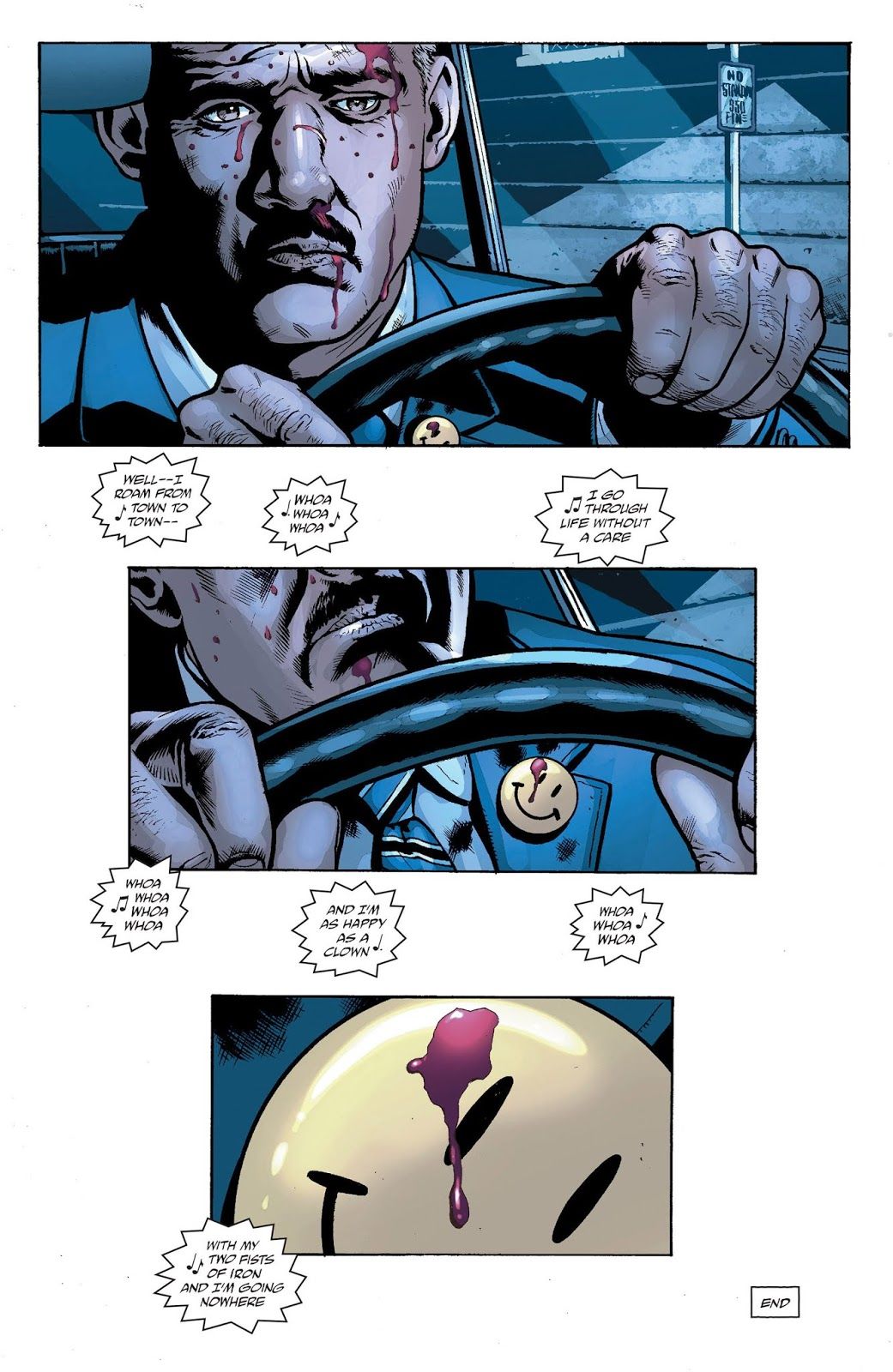Here is the latest installment of ...And the Superhuman Review, where Chad Nevett and Brian Cronin discuss each issue of DC's Before Watchmen event. Just, you know, eight years late. You can check out the earlier reviews here.
We continue with Before Watchmen: Comedian #6, "Eighties," by Brian Azzarello, J.G Jones, Alex Sinclair and Lee Loughridge
Chad Nevett: So, I want to begin with a question: was Blake brainwashed or did he kill Bobby of his own free will?
Brian Cronin: I lean towards it being of his own free will, as if he is brainwashed, doesn't that rob a lot of the drama of the moment?
Brian Cronin: Heck, his reaction overall doesn't work if he was brainwashed into doing it.
Brian Cronin: Unless you see "brainwashing" as being more of a manipulation thing.
Brian Cronin: Where he THINKS that he did it on his own volition, hence him feeling guilty.
Brian Cronin: But if you go that direction, then it doesn't really help it narratively, no?
Brian Cronin: Because if he does it on his own and he feels guilt as if he did it on his own, then what would the difference be, from a story perspective?
Brian Cronin: Unless you believe that he'd have to be brainwashed to ever actually kill his pal Bobby.
Chad Nevett: I've gone back and forth on the idea. I do agree with you in that I've settled on him doing it of his own free will.
Chad Nevett: But, I do think the doubt is there and is cultivated by the talk of his historical assassin being brainwashed by the CIA.
Chad Nevett: It's meant to be ambiguous and even his reaction plays both ways. Like he snaps out of it and just bangs his head on the steering wheel...
Chad Nevett: I don't think it's as compelling as Blake killing him for his own reasons.
Brian Cronin: A point in favor of him being brainwashed is the idea of whether or not we believe that Blake cares that much about his reputation.
Brian Cronin: There's a great bit early in the story where they note that they can't even really discharge him, because he is not actually IN the army.
Brian Cronin: So what even would be the blow to the Comedian?
Brian Cronin: Think about it, we're a few years away from the release of Under the Hood.
Brian Cronin: That was a very popular memoir that told the story of how Comedian RAPED HIS TEAMMATE.
Brian Cronin: And as we noted last time, that fact didn't even merit a mention in this miniseries.
Brian Cronin: So would him slaughtering a village in Vietnam really be something he would care about?
Brian Cronin: Unless, of course, the idea is not the reputation issue and more just the flat out betrayal aspect of it all.
Chad Nevett: I don't think it's personal. I think it's about Bobby's plans for Vietnam.
Chad Nevett: As Gordy tells Blake, Nixon plans to win the war by bringing in Dr. Manhattan. Bobby wants to end the war through peace and love. After his experiences in Vietnam, how could Blake stand by that?
Chad Nevett: It's just the same debate from issue five, but on a larger scale and written in actions, not words. That's why he feels guilty. He betrayed his friend because he thought it was genuinely the right thing to do.
Chad Nevett: Then again, as Gordy says, Kennedy's assassination would galvanise the anti-war movement... but, maybe Blake was thinking that would give Nixon more support to end the war as quickly as possible...
Brian Cronin: But Nixon's plan to end the war is Doctor Manhattan
Brian Cronin: Does Blake not know that?
Brian Cronin: He can't possibly be cool with that, can he?
Chad Nevett: While he's jealous/not a fan of Manhattan, I think he's okay with anything that ends the war. Us and them, any means necessary, etc. etc. etc.
Chad Nevett: Hell, he kills Bobby Kennedy to win the war...
Brian Cronin: I am a bit confused, though, why Kennedy being killed would make the public okay with using a superhero to end the war.
Brian Cronin: I get Kennedy's death inspiring people to stop war, period.
Brian Cronin: But why would his death have anything to do with Doctor Manhattan just ending the war by himself?
Brian Cronin: Wouldn't MOST Americans be okay with that, if they are okay with Manhattan in general? Why would Kennedy's death have anything do with anything?
Chad Nevett: Easier for Nixon to win?
Chad Nevett: It's kind of an understated element of the issue. It's almost implied that it's a choice between Kennedy and Nixon, and Blake chooses Nixon. Victory over peace.
Chad Nevett: And, on a personal level, I think he feels betrayed by Bobby, like you said.
Brian Cronin: The 1968 Democratic race for President is fascinating
Chad Nevett: Not because he's worried about his reputation, but because Bobby doesn't stand by him and his actions.
Brian Cronin: Because Kennedy just won a big primary the night that he was killed.
Brian Cronin: But he was FAR from a sure thing to be the nominee.
Chad Nevett: True.
Chad Nevett: But, something that stands out is Blake's body language at the beginning of the victory speech scene. Arms crossed, face frowning. He's not happy.
Brian Cronin: Yeah, but WHY is not happy? There are so many reasons for him to be possibly upset.
Brian Cronin: He's about to kill his friend
Brian Cronin: Or he is wrestling with the brainwashing that makes him want to kill his friend
Brian Cronin: Or he's just pissed that his friend is about to rat him out.
Brian Cronin: But I know that your take is he is not really doing this out of any personal betrayal.
Chad Nevett: I think it's both. I think Blake does it to win the war, afraid Bobby would prolong it with his vision of peace and making nice on the global stage. But, I also think he's hurt that his friend -- who he has done some pretty terrible things for (or at least for that family) is willing to cut him loose.
Chad Nevett: The two go hand in hand.
Brian Cronin: How fascinating is Azzarello's comparison of G. Gordon Liddy with Blake?
Brian Cronin: That was really clever and I think J.G. Jones character work really shined with the depiction of Liddy.
Chad Nevett: It was a cute swap of the implied killer of JFK for sure. After the first issue of this series, people wondered how it fit with the implication in Watchmen that Blake killed him... well, it was his real life lookalike, the former FBI agent turned Nixon fixer!
Chad Nevett: Pretty funny.
Chad Nevett: Especially since Blake, until this point, was Liddy's opposite in the Kennedy camp...
Brian Cronin: Yeah, I love that so much. The idea that Blake is basically just the Kennedy's Liddy.
Brian Cronin: In fact, it's so interesting to see, when you look back at history.
Brian Cronin: How Kennedy had a lot of the same types of groups that Nixon did.
Brian Cronin: I mean, as they note in this comic, The Bay of Pigs was basically just as shady as anything you could get up to as a politician and that was the stuff that we KNOW about.
Chad Nevett: That seems to be part of the reason why it was so easy for Blake to switch from Kennedy to Nixon...
Chad Nevett: Two sides of the same coin.
Brian Cronin: There are so few people out there that Blake can legitimately talk to that actually understands his life, and Liddy is one of them.
Brian Cronin: This is not a guy who really has PEERS, ya know?
Brian Cronin: And that was highlighted when we see him blow off some steam by kicking some costumed criminal ass.
Brian Cronin: And showing the disdain that he has for Nite Owl and Rorschach.
Chad Nevett: I loved the "What the fuck were you waiting for?" line. Kind of like how Blake solved Ozymandias's plot first, while those two run around in circles, he just goes after the criminals here and takes them down. He doesn't play games.
Chad Nevett: He just sees two idiots in costumes -- one playing make believe and one who buys into it so much that he's lost all grip on reality.
Chad Nevett: Effectively the same thing.
Brian Cronin: It's striking how effective the comic depicts Blake throughout the series.
Brian Cronin: In Watchmen, we never actually get to see Comedian DO anything.
Chad Nevett: Except die.
Brian Cronin: Yeah, the only real fight we see him have is the one that kills him.
Brian Cronin: We DO see him solve Ozymandias' plan.
Brian Cronin: However, he was given a lot more access than the others.
Brian Cronin: So while I agree, it was impressive that he saw through all of the bullshit.
Brian Cronin: His government connections also did lead to him learning more stuff than a typical person.
Chad Nevett: Of all of the Before Watchmen series, this one seems to do the most to undermine the original work. Azzarello retcons/contradicts several things, like the JFK assassination bit. And he presents an Edward Blake that's both in line with that book, but also more nuanced.
Chad Nevett: Is this the best approach for a series like this? I mean, when I did a reread of all of these books, this one remains my favourite.
Chad Nevett: It's the only one that kind of stands on its own.
Chad Nevett: Has its own perspective.
Brian Cronin: I guess that goes to what we alluded to, that Comedian had the most room to work with, since we really didn't get to see him DO anything in the original work.
Brian Cronin: So there was more room for Azarrello to just come up with his own take for him.
Brian Cronin: I really like the twist that Comedian wasn't always on Nixon's side, but rather flipped his way and ended up there.
Chad Nevett: That's what I'm getting at. While there was more room with Blake (though, I think the Minutemen had just as much open space to work with, if not more for some of the characters), it would have been easy to mostly stick with the version of Blake in Watchmen... and that's not this. Moore's Blake killed Kennedy, he didn't protect him and his reputation by killing Monroe.
Chad Nevett: He didn't play football with the two of brothers!
Brian Cronin: By the way, Bobby lays it on THICK here to Blake, right?
Brian Cronin: He is so EFFUSIVE in his letter to Blake that I wonder if he isn't just bullshitting Blake.
Brian Cronin: What do you think? Did they have a legitimate friendship?
Brian Cronin: Or did Bobby always just see Blake as the family fixer?
Brian Cronin: Who hero-worshipped them, so that they could manipulate them to their own ends?
Brian Cronin: Heck, we talk about brainwashing, the KENNEDYS practically gaslit Blake into being their obedient dog, no?
Chad Nevett: Pretty much. I'd have to go back and reread the first issue again, but I remember thinking that it seemed like Jack and Blake were close with Bobby just sort of there, at least with regards to Blake. And when Jack died, that relationship shifted.
Chad Nevett: Blake was never Bobby's friend.
Chad Nevett: To Bobby, he was just Jack's fixer that he got stuck with, to a degree.
Chad Nevett: Maybe that's a bit harsher than it really is, but it's not far from the truth.
Chad Nevett: Two men connected by a dead man.
Brian Cronin: So when Bobby writes so poetically to Blake, then he's just bullshitting him?
Brian Cronin: Because Bobby talks to him in the letter like they're really close.
Chad Nevett: "You're a regular politician."
Chad Nevett: I'm not saying there wasn't affection. I just think it wasn't quite as solid or genuine as either man liked to make the other think it was.
Chad Nevett: Or, rather, until this issue, Blake fooled himself in this regard as well. I think he made himself think he loved Bobby the same way he loved Jack and part of what happens here is him realizing what Bobby really thinks of him and what he really thinks of Bobby.
Chad Nevett: Like, Jack would have understood Blake's actions in Vietnam. He might have told him it was too far -- but he also would have kept it quiet and had Blake's back.
Brian Cronin: Interesting. I guess the argument here, then, is that Bobby is less willing to do the super shady stuff.
Chad Nevett: From what I know, that seems pretty consistent with the two brothers historically. Bobby was always the more uptight/straight-laced one. The crusader against crime...
Brian Cronin: Whether true or not, that's at least the archetype Azzarello is going with.
Brian Cronin: We end the series with the same song the series opened with, which was a nice touch.
Brian Cronin: With Blake as "The Wanderer."
Brian Cronin: He has now fully wandered from one side to the other while still being just as alone as he was when he started.
Chad Nevett: What do you make of the title of the issue: "Eighties"?
Brian Cronin: Shit, I meant to ask you that.
Brian Cronin: I have no idea except that, of course, as a prequel, it is ending just in time for the real story to begin, which was in the 1980s.
Brian Cronin: But the comic pointedly ends still in the 1960s, so I have no idea. You?
Chad Nevett: I've been racking my brain and can't think of anything really. This sets up the '80s of the Watchmen universe... but so does anything in these prequels...
Chad Nevett: There's a brief moment where it seems like a fakeout and that this issue jumped to the '80s with Blake and the other two costumed crimefighters... but, no, still the '60s.
Brian Cronin: That's all I could think of, yeah, that one moment DID feel like it was the 1980s
Brian Cronin: But it wasn't.
Brian Cronin: So yeah, I got nothing.
Brian Cronin: Azarello isn't typically all that subtle with his titles.
Brian Cronin: So this is quite confusing.
Chad Nevett: He likes his puns and allusions, but... this one eludes me.
Brian Cronin: I mean, the series ends with him bleeding on to his smiley face button.
Brian Cronin: So it's certainly not trying for subtly and yet the title is a mystery.
Brian Cronin: So yeah, that's the Comedian. I agree that it was a pretty good series overall. Azarello is a talented writer and Jones is a strong artist.

